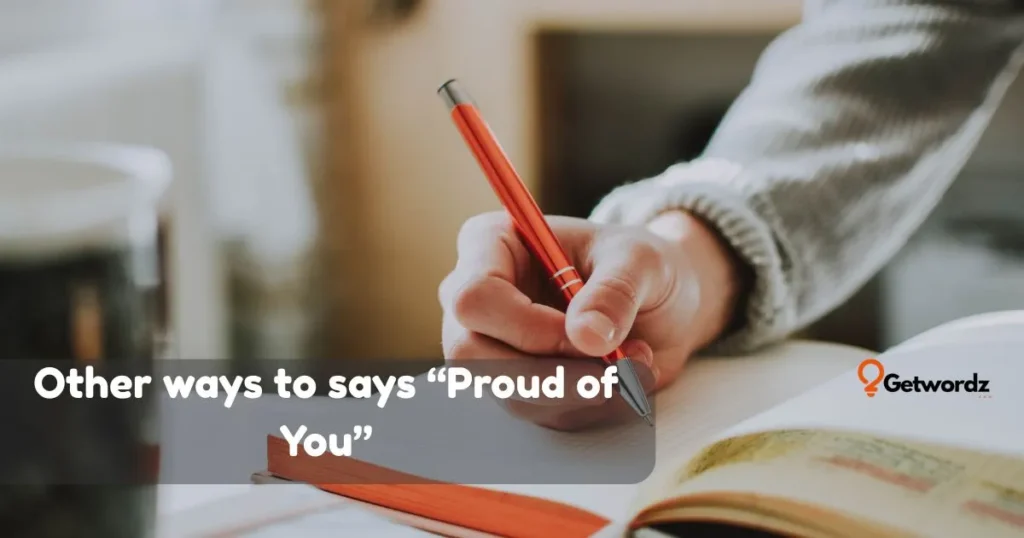“Proud of you” is a simple phrase that shows appreciation, encouragement, and admiration for someone’s achievements or efforts. We all hear it or say it so often that it can start to feel a little worn out. Whether you are congratulating a friend, cheering on a partner for a personal milestone, or acknowledging a family member’s hard work, finding the right words of encouragement can make a big difference.
Overused expressions like this can sometimes feel generic or impersonal, leaving people searching for different ways to say proud of you, creative alternatives, or unique expressions. Whether you want a heartfelt message, a funny response, or better wording, choosing the right words can make your message stand out.
In this post, you will discover fresh ways to say proud of you, clever phrasing, and personalized expressions that work for friends, colleagues, partners, and family alike. Keep reading to find the perfect way to show someone just how much you admire their efforts.
1. Proud of You
Scenario: When your sibling graduates or your colleague completes a challenging task, expressing pride and admiration feels natural and meaningful.
Explanation: Saying “Proud of you” is a simple, heartfelt, and supportive way to recognize effort and achievement. It’s a classic phrase that communicates genuine encouragement, acknowledgment of accomplishments, and personal admiration, making it a go-to creative alternative to generic praise.
Examples:
- “I am so proud of you for finishing that project ahead of schedule.”
- “You handled that challenge so well, I’m proud of you.”
- “Just wanted to say I’m proud of you for all your hard work this week.”
Why It Works: Its clarity, warmth, and versatility make it ideal for personal and professional praise, signaling sincerity without overcomplicating the message.
2. I Admire Your Efforts
Scenario: When a colleague stays late to complete a tough report or a friend tackles a difficult challenge, acknowledging dedication and persistence feels impactful.
Explanation: “I admire your efforts” is a professional yet supportive expression, a better way to say proud of you. It highlights hard work, perseverance, and commitment while remaining encouraging and genuine.
Examples:
- “I really admire your efforts on this campaign; it shows dedication.”
- “You’ve been working tirelessly, and I truly admire your efforts.”
- “I admire your efforts in learning new skills so quickly.”
Why It Works: It draws attention to effort rather than just outcomes, making praise thoughtful, motivating, and authentic.
3. You Did Amazing
Scenario: When a friend completes their first marathon or delivers an impressive performance, celebrating with enthusiasm and excitement feels right.
Explanation: “You did amazing” is casual, energetic, and supportive, offering a unique expression that adds positivity while conveying genuine admiration. It works well as a fun alternative to standard praise.
Examples:
- “You did amazing in the marathon! I’m blown away by your dedication.”
- “Your presentation was flawless, you did amazing!”
- “You did amazing organizing the charity event; everyone had a great time.”
Why It Works: Its energy and enthusiasm make it perfect for informal recognition, social media shoutouts, or casual praise, instantly spreading positivity.
4. I’m So Inspired by You
Scenario: When someone volunteers, takes initiative, or overcomes a challenge, letting them know they inspire you can strengthen connections.
Explanation: “I’m so inspired by you” emphasizes admiration and the impact of someone’s actions. It’s a creative alternative to other ways to say proud of you, highlighting motivation, respect, and personal influence.
Examples:
- “I’m so inspired by you for helping everyone in need.”
- “Your dedication to your work inspires me every day.”
- “I’m so inspired by you for staying positive under pressure.”
Why It Works: It conveys deep respect and emotional impact, showing that someone’s actions make a difference while feeling thoughtful and personal.
5. You Make Me Proud
Scenario: When your child performs in a school play or a loved one achieves a milestone, expressing personal pride strengthens relationships.
Explanation: “You make me proud” is warm and relational. It connects the feeling of pride directly to the speaker, offering a personal and authentic alternative to generic praise.
Examples:
- “Seeing you graduate makes me so proud.”
- “You make me proud every time you try something new.”
- “Your dedication to learning truly makes me proud of you.”
Why It Works: Its personal touch enhances emotional connection, sincerity, and warmth, making the praise feel meaningful and memorable.
6. You Should Be Proud of Yourself
Scenario: When a friend overcomes a personal challenge or accomplishes a goal, encouraging self-recognition feels empowering.
Explanation: “You should be proud of yourself” shifts focus to the recipient, helping them appreciate their own accomplishments. It’s a thoughtful alternative to other ways to say proud of you, promoting confidence, self-awareness, and authentic praise.
Examples:
- “You should be proud of yourself for how far you’ve come this year.”
- “After completing that tough project, you should be proud of yourself.”
- “You should be proud of yourself for handling that situation with grace.”
Why It Works: This phrase empowers the person while expressing admiration, creating a sense of self-validation and meaningful encouragement.
7. Your Hard Work Shows
Scenario: When a coworker consistently delivers excellent results, highlighting visible effort can reinforce motivation.
Explanation: “Your hard work shows” is practical, sincere, and outcome-focused. It’s a creative alternative to “proud of you” that acknowledges effort and achievement simultaneously.
Examples:
- “Your hard work shows in the quality of your report.”
- “It’s clear your hard work shows in the success of this project.”
- “Your hard work shows, and I wanted to make sure you knew it.”
Why It Works: It makes praise tangible and credible, demonstrating attention to detail while remaining motivating and authentic.
8. Keep Up the Great Work
Scenario: After a teammate delivers a successful presentation or completes a milestone, encouraging ongoing effort feels supportive.
Explanation: “Keep up the great work” is forward-looking, motivating, and versatile. It’s a friendly alternative to “proud of you” that both recognizes achievement and inspires continued effort.
Examples:
- “The presentation was excellent, keep up the great work!”
- “You handled that client perfectly. Keep up the great work.”
- “Your effort on this project is impressive; keep up the great work.”
Why It Works: Combines recognition and motivation, making it suitable for both personal and professional praise.
Read More: 30 Other Ways To Say “Sounds Good” with Examples!
9. You Nailed It
Scenario: When someone successfully completes a project, event, or challenge, a casual, enthusiastic phrase celebrates accomplishment.
Explanation: “You nailed it” is informal, confident, and encouraging. It’s a fun and creative expression that conveys admiration and satisfaction as an alternative to standard praise.
Examples:
- “You nailed it with that cake, it tastes amazing!”
- “Your presentation was flawless, you really nailed it.”
- “You nailed it by finishing that tough workout today.”
Why It Works: Its energetic tone makes praise feel personal, uplifting, and memorable, perfect for informal or social contexts.
10. I’m So Impressed by You
Scenario: When a friend, colleague, or partner goes above and beyond, expressing admiration highlights exceptional effort.
Explanation: “I’m so impressed by you” is supportive, slightly formal, and professional. It serves as a better wording alternative to “proud of you,” emphasizing skill, achievement, and dedication.
Examples:
- “I’m so impressed by you for handling that client call confidently.”
- “Your problem-solving skills are incredible, I’m impressed by you.”
- “I’m so impressed by you for completing this project ahead of schedule.”
Why It Works: Communicates respect and recognition while boosting confidence, making it suitable for both professional and personal praise.
11. You Make a Difference
Scenario: When someone’s effort positively impacts a group or community, acknowledging their contribution is meaningful.
Explanation: “You make a difference” is warm, inspiring, and supportive. It’s a unique expression that goes beyond personal pride, highlighting the positive effect someone has on others.
Examples:
- “Your volunteer work truly shows you make a difference in the community.”
- “By mentoring the team, you make a difference every day.”
- “Your actions make a difference in everyone’s lives around you.”
Why It Works: Highlights impact and significance, making praise memorable, motivational, and meaningful.
12. I Appreciate Your Hard Work
Scenario: When a colleague or friend consistently puts in effort, expressing gratitude and recognition strengthens relationships.
Explanation: “I appreciate your hard work” is professional, supportive, and genuine. It’s a thoughtful alternative to “proud of you” that acknowledges effort and dedication directly.
Examples:
- “I really appreciate your hard work on this project.”
- “Thank you! I truly appreciate your hard work these past few weeks.”
- “I appreciate your hard work in making this event successful.”
Why It Works: Shows recognition and respect while maintaining warmth, making the praise feel authentic and sincere.
13. You’re Doing Great
Scenario: When someone is progressing in a new role, hobby, or challenge, giving encouragement reinforces confidence.
Explanation: “You’re doing great” is casual, supportive, and versatile. It’s a friendly alternative to “proud of you” that boosts morale while acknowledging consistent effort.
Examples:
- “Keep going! You’re doing great on your first week at work.”
- “I can see your improvement, you’re doing great.”
- “For your first time, you’re really doing great learning this new skill.”
Why It Works: Its simplicity and positivity make it perfect for daily encouragement, informal contexts, and personal motivation.
14. Hats Off to You
Scenario: When someone accomplishes a significant milestone, celebrating their achievement with flair feels special.
Explanation: “Hats off to you” is playful, congratulatory, and enthusiastic. It’s a creative alternative to “proud of you,” adding a unique, memorable flair to praise.
Examples:
- “Hats off to you for completing the marathon!”
- “You managed the event perfectly, hats off to you.”
- “Hats off to you for solving that problem so efficiently.”
Why It Works: Adds a touch of celebration and personality, making recognition feel special and uplifting.
15. You’re Truly Remarkable
Scenario: When someone goes above and beyond expectations, expressing admiration highlights their exceptional qualities.
Explanation: “You’re truly remarkable” is warm, sincere, and expressive. It’s a unique and elevated alternative to “proud of you” that emphasizes character and excellence.
Examples:
- “I just wanted to say, you’re truly remarkable for your dedication.”
- “Your leadership skills are outstanding; you’re truly remarkable.”
- “You handled the challenge with grace, you’re truly remarkable.”
Why It Works: Highlights individuality and achievement, making the praise personal, sincere, and memorable.
16. You’re an Inspiration
Scenario: When someone overcomes obstacles or achieves personal growth, acknowledging their impact can feel motivating.
Explanation: “You’re an inspiration” conveys admiration and respect. It’s a creative alternative to “proud of you” that highlights how someone’s actions or perseverance positively influence others.
Examples:
- “Your dedication to helping others shows you’re an inspiration.”
- “Seeing your progress makes me realize you’re truly an inspiration.”
- “You handle challenges with courage, you’re an inspiration.”
Why It Works: It communicates admiration while emphasizing the effect someone has on others, making the praise meaningful and motivational.
17. I Respect Your Dedication
Scenario: When a teammate consistently delivers excellent results or works tirelessly, acknowledging commitment reinforces value.
Explanation: “I respect your dedication” is professional, supportive, and formal. It’s a better wording alternative to “proud of you” that highlights persistence, effort, and responsibility.
Examples:
- “I really respect your dedication to this project.”
- “Your long hours show how much I respect your dedication.”
- “I respect your dedication to always improving your skills.”
Why It Works: Highlights effort and professionalism, making recognition feel sincere, thoughtful, and motivating.
18. You’ve Outdone Yourself
Scenario: When someone exceeds expectations, completing a challenging task with excellence, celebrating achievement feels rewarding.
Explanation: “You’ve outdone yourself” is enthusiastic, encouraging, and informal. It’s a unique expression that conveys admiration while emphasizing achievement beyond what was expected.
Examples:
- “You’ve outdone yourself with this amazing presentation!”
- “Your performance today, wow! You’ve really outdone yourself.”
- “You’ve outdone yourself by completing that project ahead of schedule.”
Why It Works: Its energy and emphasis on exceeding expectations make it memorable, celebratory, and motivating.
19. You Make Me Smile
Scenario: When someone’s actions or achievements bring joy, acknowledging the positive impact can feel personal and heartfelt.
Explanation: “You make me smile” is warm, casual, and personal. It’s a creative alternative to “proud of you” that expresses admiration while showing the emotional effect on the speaker.
Examples:
- “Seeing your growth and determination always makes me smile.”
- “Your kindness makes me smile every day.”
- “You finished that challenge, your success truly makes me smile.”
Why It Works: Combines recognition with emotional warmth, making praise personal, heartfelt, and relatable.
20. I’m So Happy for You
Scenario: When a loved one achieves a goal, receives good news, or reaches a milestone, expressing joy for their success feels natural.
Explanation: “I’m so happy for you” is cheerful, supportive, and versatile. It’s a friendly alternative to “proud of you” that emphasizes celebration and positivity.
Examples:
- “You got the promotion! I’m so happy for you.”
- “You finished the project ahead of time, I’m so happy for you.”
- “I’m so happy for you on your graduation day!”
Why It Works: Its warmth and positivity make it perfect for personal, professional, and casual contexts, instantly conveying encouragement and happiness.
21. You’re Crushing It
Scenario: When a friend, colleague, or family member excels at a task or achieves consistent success, a casual, enthusiastic phrase motivates and praises.
Explanation: “You’re crushing it” is informal, energetic, and supportive. It’s a modern alternative to “proud of you” that emphasizes achievement and confidence.
Examples:
- “Your work on this project, wow! You’re crushing it.”
- “You handled that presentation perfectly. You’re crushing it!”
- “For your first try, you’re really crushing it learning this new skill.”
Why It Works: Its casual tone and enthusiasm make it fun, relatable, and motivational, ideal for informal praise.
22. You’ve Really Grown
Scenario: When someone improves in a skill, mindset, or personal development area, highlighting growth shows attention and encouragement.
Explanation: “You’ve really grown” is thoughtful, reflective, and supportive. It’s a meaningful alternative to “proud of you” that emphasizes progress and personal development.
Examples:
- “I’ve noticed how much you’ve improved, you’ve really grown.”
- “Through this project, you’ve really grown in confidence and skill.”
- “You’ve really grown in handling challenges with grace.”
Why It Works: Highlights progress over perfection, making praise genuine, motivating, and thoughtful.
23. You Did It!
Scenario: When someone completes a goal, project, or milestone, celebrating the achievement instantly conveys pride and excitement.
Explanation: “You did it!” is simple, energetic, and encouraging. It’s a direct and memorable alternative to “proud of you,” emphasizing success and accomplishment.
Examples:
- “You finished the marathon, you did it!”
- “All that hard work paid off, you did it!”
- “You aced the exam, you did it!”
Why It Works: Its brevity and energy make it exciting, relatable, and highly shareable in personal or social contexts.
24. Your Efforts Are Paying Off
Scenario: When someone’s consistent work leads to visible results, acknowledging progress encourages continued effort.
Explanation: “Your efforts are paying off” is supportive, professional, and motivational. It’s a practical alternative to “proud of you” that emphasizes results and consistency.
Examples:
- “Keep going! Your efforts are paying off beautifully.”
- “I can see the improvement, your efforts are paying off.”
- “All your dedication is showing, your efforts are paying off.”
Why It Works: Recognizes effort and tangible results, making praise credible, motivating, and actionable.
25. You’ve Got This
Scenario: When someone is facing a challenge or new responsibility, expressing confidence boosts morale and reassurance.
Explanation: “You’ve got this” is casual, supportive, and empowering. It’s a friendly alternative to “proud of you” that emphasizes confidence and trust in the person’s abilities.
Examples:
- “Your presentation is going to be amazing, you’ve got this!”
- “Don’t worry about the test, you’ve got this.”
- “New project starting tomorrow? Relax, you’ve got this.”
Why It Works: Its supportive tone instills confidence, making praise encouraging, motivational, and uplifting.
26. I’m Thrilled for You
Scenario: When someone achieves a milestone or receives exciting news, expressing joy adds positivity and warmth.
Explanation: “I’m thrilled for you” is enthusiastic, supportive, and celebratory. It’s a creative alternative to “proud of you” that conveys excitement while showing genuine admiration.
Examples:
- “You landed the job! I’m thrilled for you.”
- “You completed the marathon, I’m thrilled for you!”
- “I’m thrilled for you on your amazing achievement.”
Why It Works: Its energy and sincerity make praise memorable, joyful, and uplifting, perfect for personal and professional recognition.
Read More: 30 Other Ways to Say “Happy Friday” with Examples!
27. You’ve Achieved Something Great
Scenario: When someone completes a challenging task or reaches a long-term goal, emphasizing achievement reinforces their success.
Explanation: “You’ve achieved something great” is formal, sincere, and motivating. It’s a meaningful alternative to “proud of you” that highlights accomplishment and effort.
Examples:
- “You finished the project ahead of schedule, you’ve achieved something great.”
- “Completing your first triathlon is amazing, you’ve achieved something great.”
- “You’ve achieved something great by staying consistent and focused.”
Why It Works: Clearly communicates success and acknowledgment, making the praise authentic, motivational, and memorable.
28. Your Growth Is Inspiring
Scenario: When someone shows noticeable improvement in skills, behavior, or mindset, recognizing their development motivates further growth.
Explanation: “Your growth is inspiring” is thoughtful, reflective, and supportive. It’s a unique expression that emphasizes personal progress and impact, serving as a creative alternative to “proud of you.”
Examples:
- “Seeing your progress over the last year, your growth is inspiring.”
- “The way you handle challenges now, your growth is inspiring.”
- “Your dedication to learning new skills, your growth is inspiring.”
Why It Works: Focuses on continuous improvement, making praise thoughtful, motivating, and heartfelt.
29. I’m Impressed with Your Achievement
Scenario: When someone completes a project, reaches a personal goal, or overcomes a challenge, expressing admiration highlights accomplishment.
Explanation: “I’m impressed with your achievement” is formal, supportive, and professional. It’s a better wording alternative to “proud of you” that communicates recognition of success and effort.
Examples:
- “You completed the campaign flawlessly, I’m impressed with your achievement.”
- “Your performance in the presentation, I’m impressed with your achievement.”
- “I’m impressed with your achievement in completing this project ahead of time.”
Why It Works: Highlights skill, effort, and results while remaining genuine, making praise credible, motivating, and versatile.
30. Way to Go!
Scenario: When a friend, colleague, or family member accomplishes something noteworthy, celebrating with a casual, cheerful phrase feels fun and encouraging.
Explanation: “Way to go!” is informal, upbeat, and supportive. It’s a friendly alternative to “proud of you” that conveys enthusiasm, admiration, and positivity in a memorable way.
Examples:
- “You finished your first 5K, way to go!”
- “Your presentation was excellent, way to go!”
- “You aced the exam, way to go!”
Why It Works: Its casual energy makes praise fun, uplifting, and instantly relatable, perfect for informal, social, or celebratory contexts.
Pros✅ and Cons❌ of Using “Proud of You”
Pros✅
- Enhances Communication: Provides creative alternatives to express pride authentically, making messages more meaningful.
- Versatile Usage: Works across personal, professional, and social contexts with friends, family, colleagues, and partners.
- Improves Engagement: Unique expressions and fresh wording catch attention and make conversations more memorable.
- Boosts Emotional Impact: Different phrasing conveys sincerity, warmth, and encouragement more effectively than repetitive phrases.
- SEO-Friendly Content Opportunity: A keyword-rich topic attracts search intent for readers looking for creative alternatives or better wording.
Cons❌
- Potential Overload: Too many alternatives can overwhelm readers if not presented clearly and concisely.
- Context Sensitivity: Some phrases may not fit formal or professional scenarios, limiting their usability.
- Tone Misinterpretation: Casual or playful alternatives could be misread as insincere in certain contexts.
- Cultural Differences: Expressions of pride vary across cultures, so some alternatives may not resonate universally.
- SEO Competition: Highly competitive keyword, requiring strong content, LSI keywords, and examples to rank effectively.
Closing Word
Proud of You is a simple phrase, but finding fresh alternatives can make your praise feel more personal and impactful. This post shared different ways to say proud of you, offering creative expressions and unique wording to help you avoid repetitive or overused phrases.
These alternatives are perfect for celebrating friends’ achievements, recognizing colleagues at work, or adding warmth to cards, texts, and social media posts. By using creative alternatives and fresh wording, you can convey admiration in ways that feel genuine and thoughtful.
Try one of these phrases in your next message, it instantly makes encouragement more meaningful. Using these alternatives improves communication, showing sincerity, authenticity, and emotional impact.Always remember, expressing Proud of You in a heartfelt way strengthens connections and leaves a lasting impression.




